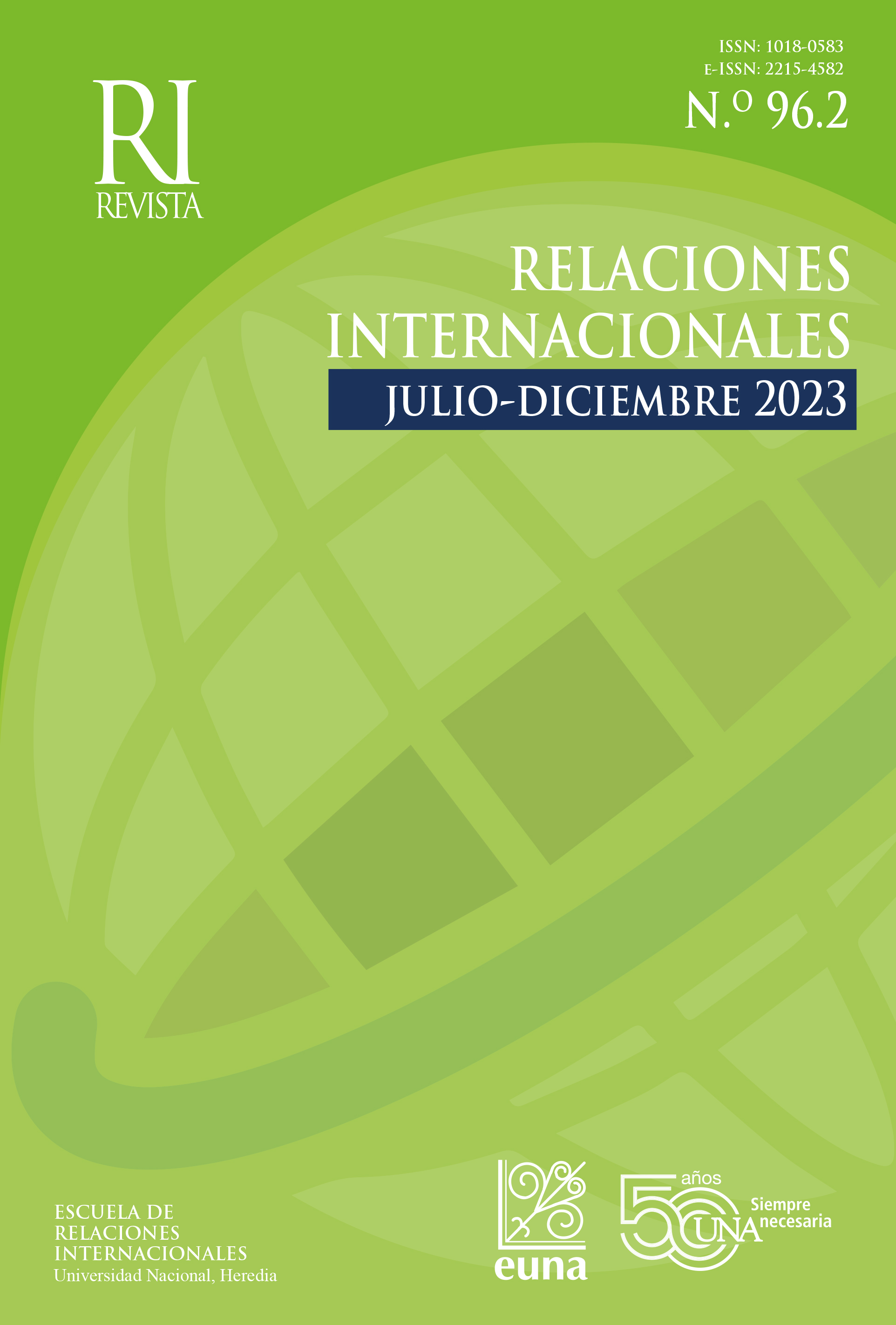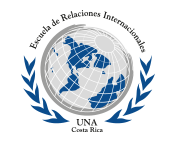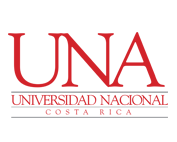|
REVISTA 96.2 Revista Relaciones Internacionales Julio-Diciembre de 2023 ISSN: 1018-0583 / e-ISSN: 2215-4582 doi: https://doi.org/10.15359/ri.96-2.4 |
|
|
|
Environmental Governance and International Relations: A Systematic Review of Theories, Methods, and Issues in Latin American Publications1 Gobernanza ambiental y Relaciones Internacionales: Una revisión sistemática de teorías, métodos y problemáticas en publicaciones latinoamericanas Elia Elisa Cia Alves2 ORCID: 0000-0002-0434-7656 Andrea Quirino Steiner3 ORCID: 0000-0002-1767-0188 Agnes María Freitas Amaral4 ORCID: 0000-0003-0673-6222 |
||
Abstract
Home to the Amazon and other important biomes and to countries with long coastlines, most of Latin America faces a variety of enduring environmental challenges. Nonetheless, the region’s academic production on international environmental policy is fragmented and dispersed. This study aims to systematically analyze the literature on environmental governance in Latin America (2004–2023), with a special focus on theoretical approaches, methods, and issues. Our sample includes papers published in indexed academic journals written in English, Portuguese, or Spanish to answer the following question: How can Latin American literature on environmental policy help us understand environmental governance in the region and globally? Complementarily, we ask the following: What topics have been prioritized? What theories and methods have been used? What gaps remain? We suggest a future research agenda and hope to help strengthen the international relations (IR) environmental governance literature by providing subsidies to improve research in the region.
Keywords: environmental policy, international environmental policy, Latin American environmental policy, systematic literature review, global environmental politics, environmental crises.
Resumen
Hogar del Amazonas y de países con largas costas, la mayor parte de América Latina enfrenta una variedad de desafíos ambientales duraderos. Sin embargo, la producción académica de la región sobre política ambiental internacional está fragmentada y dispersa. El propósito de este estudio es analizar sistemáticamente la literatura sobre gobernanza ambiental en América Latina (2004-2023), con especial enfoque en teorías, métodos y problemáticas. Nuestra muestra incluye artículos publicados en revistas académicas indexadas, escritos en inglés, portugués o español, con el fin de responder a las siguientes preguntas. ¿Cómo puede la política ambiental latinoamericana contribuir a la comprensión de la gobernanza ambiental en la región y a nivel global? ¿Qué temas se han priorizado? ¿Qué teorías y métodos se han utilizado? ¿Qué vacíos quedan? Sugerimos una futura agenda de investigación y esperamos ayudar a fortalecer la literatura sobre gobernanza ambiental de las RI proporcionando insumos para mejorar la investigación en la región.
Palabras clave: política ambiental, política ambiental internacional, política ambiental latinoamericana, revisión sistemática de literatura, política ambiental global, crisis ambientales.
Latin America is home to approximately 40% of the world’s species, more than a quarter of the Earth’s forests, a quarter of its mangroves, and the second-largest coral reef on the planet (Blackman, 2021; TNC, 2021). Despite the importance of the environment for those countries, most of them are not well positioned in terms of their social-environmental performance. For instance, considering the 21 largest Latin American countries between 2012 and 2022, eight countries had decreasing scores in the Environmental Performance Index. If Latin America were a country, its position would be 94 (out of 180 countries, considering the country’s averages), and its score would be 41.09 out of 100 (EPI, 2022). Socially, 18 of the 20 most unequal5 countries in the world are located in Latin America (World Bank, 2022). Politically, the region has staged frequent corruption scandals and recurrent coup attempts6, and major government actors have been absent or have not actively participated in leading global environmental negotiations and accords (Gallagher, 2012; Kopra, 2020). Nevertheless, some countries, like Brazil, have enormous potential in terms of environmental leadership (Hochstetler, 2022), and in specific topics countries have promoted remarkable initiatives (Castro et al., 2011).
Although it cannot do this on its own, academia is crucial to finding solutions to mitigate the global environmental crisis (Castro et al., 2011). Yet, regardless of the importance of understanding environmental governance dynamics in the region, Latin American countries’ academic production concerning environmental policy and governance seems to be fragmented and dispersed. This is especially true when considering the international level of analysis.
Therefore, we seek to answer the following question: How can Latin American environmental policy literature help us understand environmental governance in the region and globally? Complementarily, we seek to map what theories and methods have been used, what topics have been prioritized, and what gaps remain. In short, this study aims to systematically analyze the environmental governance literature published in Latin American journals registered by the SciELO Index. We focus on theories, methods, and issues used to analyze the international dimension of governance. Our sample includes 69 peer-reviewed papers written in English, Portuguese, and Spanish. We hope to help strengthen the IR (International Relations) environmental governance literature by providing subsidies to improve research in the region.
This paper is organized in the following manner. Section 2 discusses how international relations (IR) perspectives deal with the environment in terms of theories, methods, and issues framing the main categories used in our empirical analysis. Section 3 presents the main types of literature review and the protocols adopted here. Section 4 presents some bibliometric results and applies the categories we identified previously in a self-compiled database of 69 Latin American articles published between 2004 and 2023. Section 5 presents our final considerations, highlighting the main gaps and challenges identified and suggesting a future research agenda.
2.International Relations and the Environment: Theories, Methods, and Issues Towards the Idea of Environmental Governance
Global environmental politics is complex and challenging and has been the subject of much research. The debate around this topic has become increasingly interdisciplinary, with contributions from scholars of a variety of fields—including international relations, political science, geography, environmental science, and economics. Before attaining a broader perspective, such as environmental governance, several different theoretical approaches coexisting to this day were developed.
Stevis (2014) draws a trajectory of studies in international environmental politics (IEP) since World War II and points out how the area has broadened over time in terms of scope and approaches. According to the author, the early literature was dominated by Anglo-American scholars applying geopolitical frameworks, which focused on global environmental problems such as overpopulation and the exploitation of natural resources. By the mid-1960s, ecopolitical thinking had begun to emerge, which emphasized the interconnectedness of the global ecosphere. In the following decade, there was a shift towards more specific issues, such as ocean pollution and the law of the sea.
Two major ideas stood out in the 1980s: sustainable development and global environmental change. By the end of the 1990s, the growing awareness of the interconnectedness of environmental problems, the increasing number of international environmental agreements, and the rise and strengthening of non-state actors in politics favored a broader theoretical umbrella that brought forth a distinct subfield within international relations: global environmental politics. The consolidation of the idea as a discipline resulted in the creation of a journal with the same name. Global Environmental Politics (GEP) was created in 2000, with Peter Dauvergne as founding editor.
Nevertheless, organizing theoretical contributions within such complex research agendas is difficult. Considering the international relations field is generally divided between positivist and postpositivist or critical approaches, most authors agree on the predominance of the traditional paradigms from IR theories: realism, liberalism, constructivism7 (as positivist approaches), structuralism, Marxism, post-structuralism, and feminism (as critical approaches), among others. Yet most analysts recognize that this theoretical picture looks like a mosaic when dealing with IR concepts such as sovereignty, anarchy, territory, power, interest, competition, cooperation, and inequality within environmental politics’ research topics.
Although it is still not a mainstream topic within the three most traditional IR theories—realism, liberalism, and constructivism—the environment has become a prominent issue within the field. Even within state-centered theories, nature can be studied in regard to its capabilities, raw materials, and, ultimately, the disputes it can cause in terms of power and interests (O’Neill, 2015).
The international regime literature, for example, has received many contributions from studies on the formation, development, implementation, and effectiveness of environmental regimes (Mitchell et al., 2020), especially within a neoliberal IR theoretical framework. Dialoguing with institutionalists such as Ostrom (1990) and Young (1997), theoretical advances have been made regarding international cooperation based on communication and trust, even in cases of conflicting interests. This literature has also contradicted the traditional anecdote of the Tragedy of the Commons, popularized by Hardin (1968), arguing that common resources would inevitably be overused without a central authority to regulate their use. Here, constructivists have pointed out that self-interest is not necessarily the only driver of the international system since countries’ interests and behaviors cannot be fixed but might be shaped by shared understandings of ideas and norms (Robertson, 1992).
Structuralists work from a different perspective, highlighting the predominance of fundamental constraints over relationships. Therefore, Marxists, feminists, and most green theorists work on structural inequalities (of class, gender, race, underdevelopment, etc.) and analyze both as the causes or the consequences of political relationships regarding the environment (Stevis, 2014). Despite not necessarily departing from the same perspective of the world, the idea of providing normative solutions is also on the rise among the works of authors discussing global environmental ethics and justice (Sachs et al., 2022).
Parallel to those advances, a wave that started in the late 1980s (Hempel, 1996) and became consolidated in the 2000s diffused the idea of governance from an environmental perspective. This literature began to notice flexible multilevel (Vogler, 2003) and polycentric (McGinnis, 1999) arrangements to build cooperation strategies and networks among social actors that were previously underrated in policy process analyses: corporate interests, social movements, scientists, and non-governmental organizations (Harris, 2014). According to Biermann (2014), this phenomenon was promoted by a series of elements in world politics, such as the increased participation of non-state actors cooperating at various levels, such as transnational networks with relevant effects in politics.
This theoretical umbrella became a response to the growing awareness of the interconnectedness of environmental problems and the need for conceptual elements to address the complexity of new actors in international environmental politics. After all, in practice, societal actors were becoming increasingly political by interacting within flexible patterns of authority in global politics, moving to regional and global levels and, at the same time, to subnational and local levels (Roger et al., 2023).
Over the years, IR literature has developed ways to organize empirical research on environmental governance from an international perspective. O’Neill (2015), for instance, has conceptualized three main modes of environmental governance studies in IR: international environmental cooperation, non-state global environmental governance, and global economic governance. According to her, international environmental cooperation, which encompasses research based on analyzing environmental agreements negotiated and signed by states, is the dominant mode of studies on global environmental governance. Non-state global environmental governance, in her perspective, focuses on non-state actors such as scientists, non-governmental organizations (NGOs), and businesses. Finally, global economic governance regards decisions about trade, foreign investment, short-term capital flows and development flows, and arrangements with environmental consequences. More recently, Alger & Dauvergne (2018) have proposed a classification that adds two other groups. Thus, their five categories include 1) global political economy, 2) international institutions and non-state governance, 3) ecological crisis, 4) climate politics, and 5) scholar activism and engaged research.
The first group, similar to O’Neill’s (2015) category, includes studies focusing on the relationship between the global economy and environmental change. Although this group covers studies on trade, finance and supply chains, and different implications of environmental degradation for the global North and South, there are also contributions regarding corporate self-governance schemes and critical approaches regarding capitalism and consumerism. Scholars within this group may be skeptical regarding the conciliation of economic growth and environmental sustainability. They may argue that the current global economic system is based on unsustainable consumption and production levels and is leading to environmental degradation and climate change. They may also be agnostic due to the complex linkages between the global economy and the environment. Nevertheless, most researchers agree that the global political economy needs to be fundamentally transformed if we are to achieve environmental sustainability with substantial reductions in consumption and production of goods and services and with increases in sustainable business and technologies (Alger & Dauvergne, 2018).
The second category concerns studies on the complex array of agreements and institutions to coordinate state action. As governance is fragmented and overlapping—with different treaties and governing bodies for climate change, biodiversity, ozone, and ocean conservation, for instance—the causes and consequences of these initiatives vary. This group of research comes from different streams of IR scholarship, from liberal institutionalism to the skepticism of realists. Some of the key questions within this category are related to agenda formation, non-state actors’ influence in governance processes, and how emerging economies and the global South have asserted themselves in global environmental governance. There is also a space for research questions on the effectiveness of voluntary corporate sustainability commitments, activist networks, and subnational actors (Alger & Dauvergne, 2018).
The category that Alger & Dauvergne (2018) call “ecological crises” regards issue-specific studies, excluding climate. Climate has its own category because a review by Dauvergne & Clapp (2016) found it encompassed roughly one-third of the publications on global environmental politics. According to the authors, studies that have investigated causes, impacts, and challenges to prevent environmental problems related to food and agriculture, water, and energy have received more attention than others, such as topics like fracking, geoengineering, marine biodiversity conservation, pesticides, plastic pollution, and space pollution (Alger & Dauvergne, 2018).
As mentioned, due to the greater number of publications on climate politics, Alger & Dauvergne (2018) have placed this topic into a separate category of governance. The main point here is to show the complexity of the issue and the need to focus on the specifics of climate governance. The purpose is to reveal the political contentiousness of climate change and how power relations shape the climate change debate.
The last category, scholar activism and engaged research, includes a growing body of literature that deals with the approximation of scientists and activists in an effort to find adequate and just solutions to address environmental problems. This category may include studies addressing normative positioning to tackle transparency issues (Alger & Dauvergne, 2018).
This paperused Alger & Dauvergne’s (2018) categories to classify the literature reviewed. Despite some limitations, we believe their five categories are the most comprehensive compared to the other existing classifications.
One type of work that is not covered directly by Alger & Dauvergne’s (2018) classification is that of the interdisciplinary and multi-thematic approaches that aim to understand complex interactions between economic systems, the environment, and society. Some examples are the triple planetary crisis or boundaries, the water-food-energy nexus, and so on. This literature has grown remarkably over the past few years. For our analysis, we have included this kind of work in the “ecological crisis” category, especially in cases when the text does not use a PS/IR theoretical framework.
The field of global environmental governance studies is recognized by its methodological eclecticism (Young, 2020). Mainstream methodology in this subfield has consisted mainly of theoretically grounded qualitative case studies (Andresen et al., 2012).
From the 1990s to the beginning of the 21st century, many important, methodologically rigorous contributions were published discussing how to study international environmental regimes, such as the work of Carsten Helm, Jon Hovi, Edward Miles, Detlef Sprinz, Arild Underdal, Oran Young, and colleagues (see, for instance, Helm & Sprinz, 2000; Young, 2001; Miles et al., 2002; Hovi et al., 2003; Underdal, 2004). Around the same time, we can also cite discussions on the use of case studies (Mitchell & Bernauer, 1998, 2004; Breitmeier et al., 2006; Steiner, 2011), game theory (Kilgour & Wolinsky-Nahmias, 2004), and quantitative methods in general (Sprinz, 2004) to study international environmental politics and policy. Nevertheless, Hochstetler & Laituri (2014) have argued that empirical researchers in international environmental politics have devoted little attention to methodology.
Since then, there have been several advances in IR methods for environmental studies, both in international regimes literature and within broader perspectives encompassing socio-ecological systems analyses (de Vos et al., 2019; Biggs et al., 2021). There have also been relevant methodological discussions in environmental governance (Hochstetler & Laituri, 2014; Stokke & Underdal, 2015; Lim & Prakash, 2015). Other topics include, for example, comparative methods to study climate governance (Purdon, 2015) and novel methodological approaches to study environmental negotiations post-COVID (Hughes et al., 2021). However, important gaps remain, probably related to IR methodological deficits in general (Medeiros et al., 2016; Carvalho et al., 2021).
Hochstetler & Laituri (2014) point to an important difference regarding methods and approaches in environmental politics studies compared to other IR studies: the link to the natural world and physical and biological studies brings different disciplines’ standards and approaches in addition to straightforward dialogue opportunities. Choucri (1993) has named this the linkage challenge. This author also lists two other challenges when studying the environment-policy interface: the political challenge (i.e., developing appropriate common concepts and approaches) and the institutional challenge (identifying adequate institutional responses). Lastly, a difficulty that is only recently being uncovered by the literature is that of the different time frames and temporal discourses of policy and conservation (Hom & Steele, 2016).
The social sciences have long advanced on the strengths and weaknesses of specific research designs and methodologies. On the one hand, while qualitative methods are useful for generating hypotheses and understanding complex causal relationships, their findings can be difficult to generalize. On the other hand, quantitative methods are more effective for hypothesis testing and for evaluating policies but can be less effective for understanding complex causal relationships (Young, 2020).
One of the challenges of working with socio-ecological research in general is related to data. First, as mentioned, it is difficult to operationalize and model key concepts, variables, and relationships, especially for political variables. A second challenge is data governance, which involves difficulties around data collection, storage, curating, processing, and analysis challenges. Such processes can be expensive and time-consuming, reflecting global inequalities in scientific knowledge production (Adamson & Lalli, 2021). The type of observation analyzed can vary, including agreements, conventions, discourses, documents, indexes, interviews, surveys, laws, meeting minutes, projects, protocols, records, reports, and scores, but also emissions, particle density, hectares of forests, nautical miles, fertility rates, and other kinds of technical data which might not always be palatable to social scientists.
Specifically for global environmental governance studies, O’Neill et al. (2013) list four methodological challenges: 1) complexity and uncertainty, 2) vertical and horizontal linkages across 3) different scales and issue areas and 4) evolving problems and institutions. In a review of 298 articles published in the journal Global Environmental Politics (2001–2012), these authors found that only 11% of commentary articles and 41% of research articles included a discussion of the methods used. Also, only three articles were focused solely on methods. To face these challenges, the authors suggest employing mixed methods and collaborative, multidisciplinary studies as a more effective way to understand complex environmental problems.
To classify the methods used by the studies reviewed here, we created four broad categories: theoretical work, qualitative work, quantitative work, and mixed methods.
The growing concern for the global political aspects of the environment cannot be explained merely as a function of scientific and technological insights into the causes, scale, and scope of environmental degradation. Nevertheless, environmental historians have demonstrated clear links between industrialization, globalization, and environmental degradation, all of which are processes that increased exponentially during the twentieth century (O’Neill, 2015).
The post World War II era caused concern with resource depletion due to the predominant economic development models diffused globally (Cia Alves & Fernandes, 2020). Nevertheless, the United Nations has also played a key role in catalyzing international cooperation on environmental issues. The UN Conference on the Human Environment in Stockholm and the establishment of the UN Environment Programme (UNEP), both in 1972, were key events to global environmental cooperation. Since then, academic literature has advanced in different streams of empirical research. This research encompases not only transboundary commons, such as forestries and global climate but also addresses local resources and issues, like desertification and water governance. These studies consider cumulative and systemic approaches from socio-ecological perspectives. In fact, under O’Neill’s (2015) perspective, all environmental problems end up becoming international: if they do not cross over national borders, they are likely to occur in many, if not all, countries.
In the previously cited review of the literature about Global Environmental Governance, Dauvergne & Clapp (2016) divided the articles published in the first decade and a half of the journal (2000–2015) into three broad thematic categories: 1) formal global environmental governance initiatives, 2) market-based governance initiatives, and 3) climate change. Within these categories, they found that almost half of the articles dealt with international environmental regimes and governance institutions. The authors also report that articles have focused on multilevel governance. About one third dealt with climate change. In terms of specific topics, about 60% of the papers analyzed one or more. Major themes were, of course, climate change, followed by forests and biodiversity, waste, ozone depletion, fisheries, chemicals and pesticides, mining, nuclear energy, and whaling. The authors also highlight that this departs from themes analyzed more frequently in previous decades, such as air pollution and ozone depletion.
One major trend regarding issue-specific works in the field are multi-thematic studies employing frameworks such as the triple planetary crisis (Passarelli et al., 2021), the energy-water-food nexus (Dias et al., 2023), or planetary boundaries (Viola & Franchini, 2012a; 2012b).
Unfortunately, despite the growing studies on the environment within IR in terms of theories, methods, and themes—as highlighted throughout this section—Pereira (2017) found that only 2–3% of IR articles published every year in 20 top IR journals (2008–2014) focused on environmental issues. When excluding climate change, this percentage dropped to less than 1% of a total of 9,680 articles analyzed. Conversely, this body of work seems to be better represented among the most cited articles. Pereira (2017) found that these papers showed up consistently among the top 100 most cited political science/IR (PS/IR) articles (between 4 and 23 of the articles published every year, 2004–2013). This number was even higher when considering citations outside of the field, which is probably due to the multidisciplinary nature of environmental issues.
Pereira (2017) also points out that only one of the 20 most influential8 IR authors has published about environmental issues: Robert Keohane. In a review of this author’s environmental publications, Barbosa (2023) found that most of Keohane’s work focuses primarily on cooperation and institutional aspects. Climate change is the environmental theme the author has discussed the most, followed by energy policy.
Similarly, in 2004 and 2006, the TRIP Faculty Survey9 offered the option of “International Environment” when asking scholars about their areas of research within IR. Unfortunately, this option was discontinued in subsequent editions of the survey (a choice which is interesting in itself). However, for the two editions cited, 2.06% and 2.83% of scholars listed the topic as their main area of research, respectively. When considering the environment as a secondary topic of research, the numbers were higher: 5.51% and 5.15% (Maliniak et al., 2011).
We classified the literature reviewed here into nine categories, considering the main environmental topic studied in each article: air pollution, biodiversity conservation, climate change, energy transition, forests, mining and land use, ocean and Antarctic governance, waste, and water governance. Two more categories were employed: one for papers that did not focus on specific environmental issues, named “theoretical work,” and another analyzing “issues” from a multi-thematic approach. In the next section we present our methods and procedures, including details on how we classified the papers reviewed.
3.The Systematic Literature Review: Methods and Procedures
According to Borenstein et al. (2021), narrative reviews were common up to the 1990s, but they were limited by the reviewers’ subjectivity and were difficult to update. Thus, systematic literature reviews (SLR) and meta-analysis became more common. Since then, several types and typologies of literature reviews have proliferated. Sutton et al. (2019) identified 48 types of literature review and categorized them into seven “families”: 1) traditional review, 2) systematic review, 3) review of the review, 4) rapid review, 5) qualitative systematic review, 6) mixed-method reviews, and 7) purpose-specific review.
Systematic literature reviews map a body of literature based on the adoption of predefined, explicit protocols, and choice criteria10. The purpose is to organize the literature on a given topic logically and transparently, which other researchers can easily replicate. According to Borenstein et al. (2021), SLR involves determining clear rules to seek out the studies to be reviewed and for inclusion and exclusion criteria. These authors admit that there is still some degree of subjectivity, but “because all of the decisions are specified clearly, the mechanisms are transparent” (p. xxix).
Despite different approaches, many types have a similar step-by-step process. Here, we followed the recommendations by Cia Alves et al. (2022) on the Preferred Reporting Items for Systematic Reviews and Meta-Analyses (PRISMA) framework. The specific protocol adopted here was PRISMA-ScR (PRISMA for Scoping Reviews)11. The PRISMA-ScR guidelines describe a minimum set of items that must be included in a research report. These guidelines increase transparency, help understand results, and act as a roadmap for writing results (Tricco et al., 2018).
Each review begins with a question. This determines what will be sought out, which repositories will be accessed, what sources and content will be selected, and what will ultimately be extracted and analyzed. With our research question—How can Latin American environmental policy literature contribute to the understanding of environmental governance in the region and globally?—we sought to focus on Latin American literature in Latin American journals. Among several possible repositories, we chose to access the SciELO Index through the Web of Science. This repository includes the most important indexed journals in the region, with articles in Portuguese, English, and Spanish.
SciELO’s bibliographic indexes are fed by digital records, which allows for the analysis of specific areas and topics. One of the main advantages of the SciELO Network is that it provides Open Access (OA) to the journals’ content. Journals are organized in national and thematic collections managed by nationally recognized research organizations and maintained by scientific advisory committees.
After selecting the repository, we established article exclusion criteria. This step is essential both to guarantee the representativeness of the sample and to make the study logistically viable. In our case, we did not impose any time restrictions, but we only considered peer-reviewed papers related to the International Relations field published in English, Spanish, or Portuguese in Latin America.
The fourth step was to determine the descriptors. We opted to search for documents with the terms “Environmental” AND “Governance” within the topic (title, abstract, or keywords)12.
We performed the search per se on April 28, 2023. This first search returned a total of 147 articles. After reading the titles and abstracts, we excluded publications that were not peer-reviewed, as well as publications other than journal articles (e.g.: editorials, book reviews, communications). We also excluded anonymous work and articles that were not from Latin American journals (some were from South African journals, for instance). As mentioned, one of the most important exclusion criteria was eliminating papers not dealing with environmental governance from an international relations perspective, such as analyses linked exclusively to discussions from anthropology, pedagogy, public policy, sociology, or tourism viewpoints.
After the search, the fifth step was to list the articles in a spreadsheet with columns informing metadata using Google Sheets.13 During the sixth step, we built the sample when two of the authors selected the papers that were to be included in our final database, considering our predefined criteria. Although the selection was blindly reviewed, the concordance index, such as Kappa, was not calculated in the present study.
The articles were selected by title, then by abstract, and finally, by reading the full text. After reading the title and abstracts, our database included 76 articles. Yet after we read the full papers14, our final number was 69. The selection diagram is presented in Figure 1.
The seventh step consisted of defining the variables to classify the articles. The categories applied were based on the discussion presented in Section 2 and are reported in Table 1. Lastly, after classifying the articles, we discussed the results, providing 1) an overview of the concepts, topics, and types of evidence available and 2) the limitations of the review.
Figure 1. The PRISMA 2020 flow diagram used in this study.
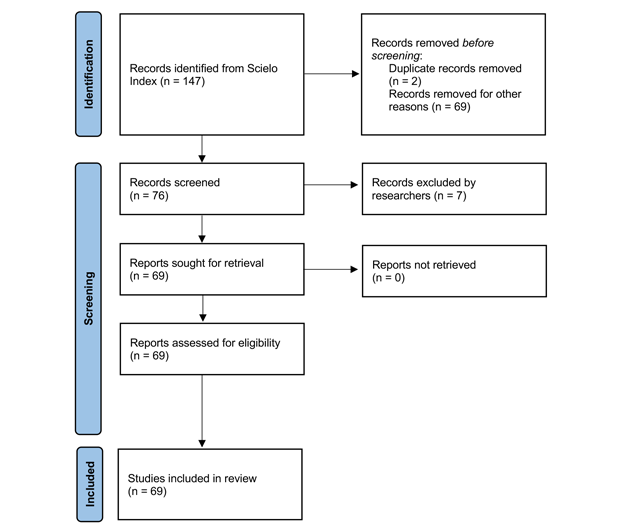
From: Page MJ, McKenzie JE, Bossuyt PM, Boutron I, Hoffmann TC, Mulrow CD, et al. The PRISMA 2020 statement: an updated guideline for reporting systematic reviews. BMJ 2021;372:n71. doi: 10.1136/bmj.n71
Table 1. Categorization and Codebook
|
Variable |
Category |
Code |
|
Main IR Theory employed |
None |
0 |
|
Realism |
1 |
|
|
Liberalism |
2 |
|
|
Constructivism |
3 |
|
|
Critical studies (structuralism, Marxism, post-structuralism, feminism, green) |
4 |
|
|
Environmental Justice |
5 |
|
|
Main GEG approach used |
Global political economy |
1 |
|
International institutions and non-state governance |
2 |
|
|
Ecological crisis |
3 |
|
|
Climate politics |
4 |
|
|
Scholar activism and engaged research |
5 |
|
|
Research design |
Theoretical work |
0 |
|
Case studies |
1 |
|
|
Comparative studies |
2 |
|
|
Large-n |
3 |
|
|
Methodological Approach |
Theoretical work |
0 |
|
Qualitative |
1 |
|
|
Quantitative |
2 |
|
|
Mix methods |
3 |
|
|
Central issue studied |
Theoretical |
0 |
|
Air pollution |
1 |
|
|
Biodiversity conservation |
2 |
|
|
Climate change |
3 |
|
|
Energy transition |
4 |
|
|
Forests, mining, and land use |
5 |
|
|
Ocean, marine, and Antarctic governance |
6 |
|
|
Waste |
7 |
|
|
Water governance |
8 |
|
|
Multi-thematic |
9 |
Source: Authors.
4.Latin American Perspectives on International Environmental Governance
Here, we present the main results of our analysis. The time series of the number of publications, shown in Figure 2, indicates that this number increased over time. The first papers to employ the term “environmental governance” from an international perspective in Latin America are from 2004. Barros-Platiau et al. (2004) presented a theoretical review on international relations and the environment, while Santés Álvarez (2004) discussed the idea of “good environmental governance” from a local approach—he discussed the case of hazardous waste in Mexico and its transboundary effects and framed the issue from a non-state governance perspective.
From then on, there has been a steady increase in the number of yearly publications. The peak was eight publications in 2012. This might be related to the Rio+20 United Nations Conference on Sustainable Development, as five of the eight articles mention this event.
Figure 2. Number of Latin American international environmental governance publications per year
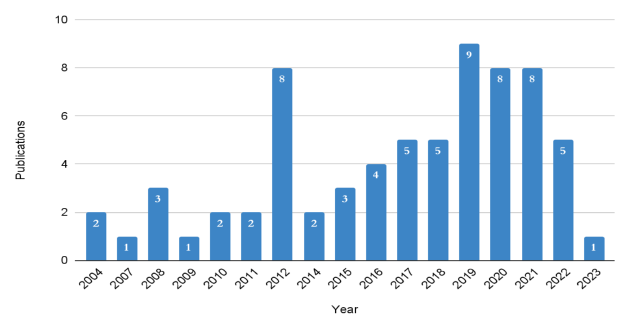
Source: Data collected for this article. 2023 considers articles published until April 28th.
Together, Brazilian and Mexican journals were the source of 78.2% of the international environmental governance publications reviewed (Figure 3).
Figure 3. Geographical distribution of publications
.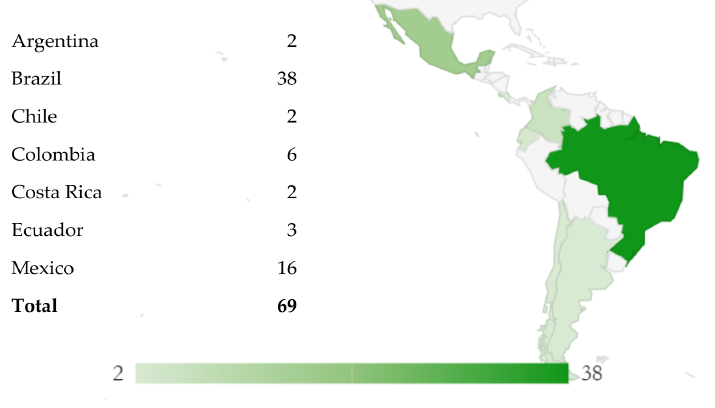
Source: Data collected for this article (01/2004–04/2023).
Regarding the main author’s affiliation, the University of Brasilia, Brazil (UnB, in Portuguese) had the most publications: eight articles were from its International Relations Institute. Among the 38 publications from Brazilian journals, only six were not authored by researchers affiliated to Brazilian institutions, and none of those institutions were from Latin American countries (Table 2). This possible bias, which might be due to language, was not found in Mexican journals: in this case, in addition to contributions from Mexican institutions, we also found articles from authors affiliated to institutions in Argentina, Colombia, Costa Rica, Uruguay, and the United States.
Table 2. Author affiliation from papers published in Brazilian journals without the contribution of authors from Brazilian institutions.
|
Title |
Author, Year, and Institution Affiliation |
|
Community protocols as tools for resisting exclusion in Global Environmental Governance |
(Delgado, 2016), McGill University, Canada |
|
Diplomatic culture and institutional design: Analyzing sixty years of Antarctic Treaty governance |
(Sampaio, 2022), University of London, United Kingdom; Universität Bielefeld, Germany |
|
The changing face of environmental governance in the Brazilian Amazon: indigenous and traditional peoples promoting norm diffusion |
(Chase, 2019), University of Massachusetts Boston, United States |
|
The problem of expertise and the question of environmental governance |
(Létourneau, 2014) Université de Sherbrooke, Canada |
|
Women and the environment: a crucial relation for the sustainability transition. |
(Schmidt & Gomes, 2020) Universidade de Lisboa, Portugal |
|
The Brazilian Federal Government’s Role in the Prioritization of EU Foreign Direct Investment and its Environmental Agenda |
(Walsh-Führing, 2018) University of Bremen, Germany |
Source: Authors.
Figure 4 shows the distribution of the 69 publications among 45 different journals indexed by SciELO. On one hand, it seems clear that no Latin American journal is directly focused on international environmental governance, such as the United States journal Global Environmental Politics. On the other, the two journals that seem to devote the most space to this issue are Región y Sociedades, from the El Colegio de Sonora (Mexico), and Ambiente & Sociedade, from the National Association of Graduate Programs and Research in Environment and Society (ANPPAS, in Portuguese), Brazil15. Neither of these mentions international environmental governance in its “aims and scope” section.
Figure 4. Number of publications by indexed journal LeL
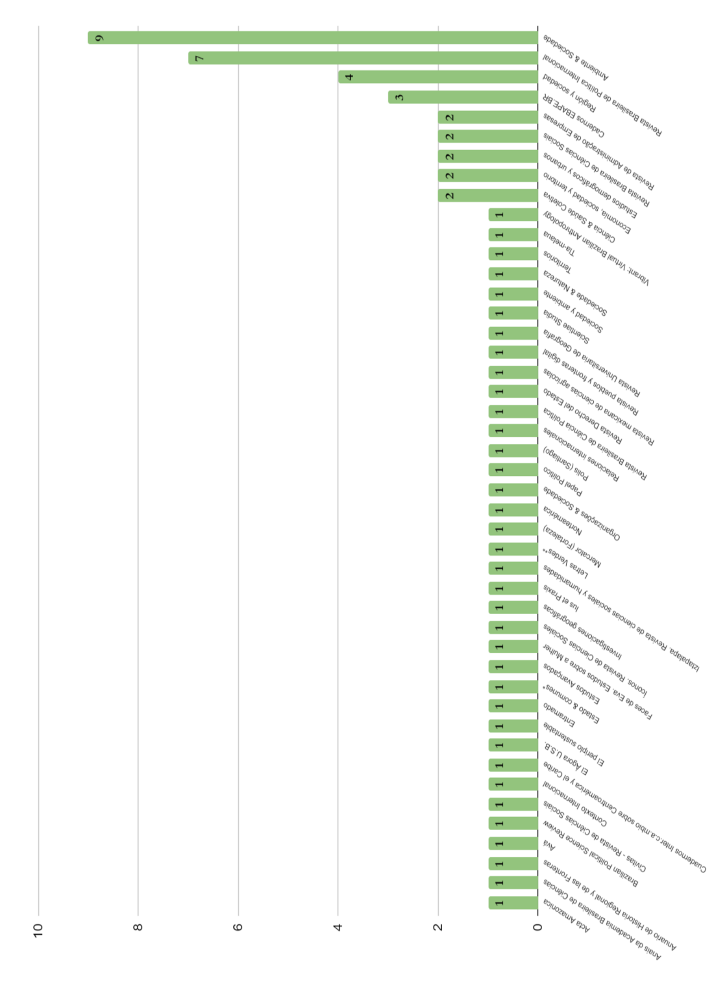
Subtitles: *Estado & comunes, revista de políticas y problemas públicos. **Letras Verdes, Revista Latinoamericana de Estudios Socioambientales
Source: Data collected for this article.
Figure 5 illustrates how the different theoretical streams evolved over time. Regarding the broad theoretical frameworks within IR, most articles employed constructivism (34.78%). These papers discussed topics such as the role of science in environmental conservation or in the changing perception of specific concepts over time. Another common framework was liberal institutionalism (31.88%), although a considerable number of studies also employed critical (14.49%) and environmental justice approaches (10.14%). We did not find any papers employing realism as a theoretical framework.
Figure 5. Number of publications by IR Theory by time
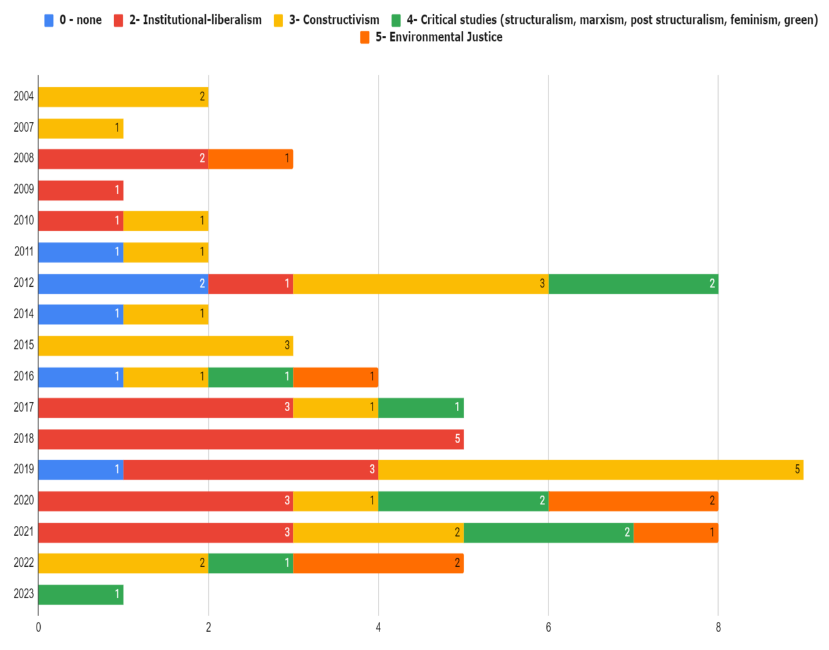
Source: Data collected for this article (01/2004–04/2023).
According to Alger & Dauvergne’s (2018) work, the effort to classify global environmental governance approaches resulted in an impressive body of publications within the international institutions and non-state governance category (50.72%). This category encompassed a combination of vastly different types of work, such as that by Andrade (2009), who analyzed the participation of private groups in environmental governance. Differently, Pastrana et al. (2010) analyzed the relationship between globalization and local environmental problems.
The second-largest category was the global political economy (growth, trade, finance, supply chains, technology)—17.39% of the contributions fit into this topic. It was possible to map contributions regarding environmental links to trade, finance, international cooperation, and land ownership. However, we did not find contributions on supply chains and technology—a possible gap within the region’s literature.
Also, 13.04% of the papers reviewed were classified into the scholar activism and engaged research category. This seems to be a recent trend since half of the articles published between 2020 and 2022 fit into this category. A total of 11.59% of papers fit into the ecological crisis category. Finally, different from what was found by Alger & Dauvergne (2018), only 7.25% of articles fit into the climate politics category (Figure 6). In Table 3, we highlight some of the themes dealt with within Alger & Dauvergne’s (2018) categories.
Figure 6 . Number of publications according to Global Environmental Governance approaches by year (01/2004–04/2023)
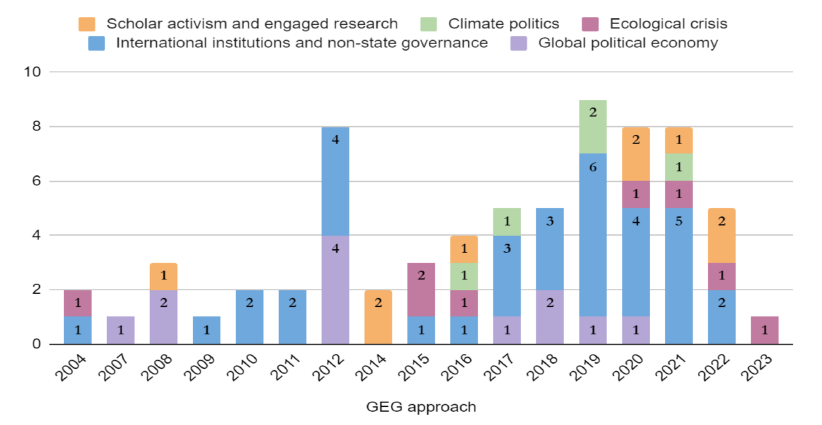
Source: Authors.
Table 3. Global environmental governance research in Latin America, according to categories created by Alger & Dauvergne (2018)
|
Category |
Main aspects |
Examples from Latin America |
|
Global political economy |
Connections between the global economic arena (growth, trade, finance, supply chains, technology) and the environment |
Sarfati (2008): multinational companies within the Cartagena Protocol Gómez & Ferrero (2012): forest governance Hochstetler & Inoue (2019): South-South relations and international development cooperation |
|
International institutions and non-state governance |
Agenda formation, non-state actors in governance, global South |
Andrade (2009): private sector in GEG Aguilar Cavallo (2020): Escazu Convention |
|
Ecological crisis |
Issue-specific research, excluding climate |
Martins (2015): water governance Liscovsky et al. (2015): fishing |
|
Climate politics |
Work related to climate change |
Santos (2017): global justice under the Paris Agreement Pérez Melchor, S. Y. (2019): climate politics in Latin America |
|
Scholar activism and engaged research |
Work promoting approximation of scientists and activists in order to provide just and adequate solutions to address environmental problems |
Schmidt & Gomes (2020): women and the environment Lindao et al. (2022): ethnic issues in environmental governance |
Source: Data collected for this article (01/2004–04/2023).
Our database included a single literature review (Castro et al., 2011) published in Ambiente & Sociedade. It discusses environmental governance in Latin America and reinforces the importance of the region’s historical and cultural context. The authors emphasize the need to analyze the process of environmental governance in this region from an integrated and transversal perspective, including dialogue with research communities. In their work, the authors mention a few initiatives to analyze environmental problems from this general Latin American perspective. More than ten years after this revision, we still found that most studies have a localized perspective on environmental problems without a cross-cutting dialogue from a Latin American perspective.
Also, as expected, some empirical papers published in the region’s journals do not deal with Latin America. In fact, only 4.35% of the articles dealt with broad questions of global environmental politics (Andrade & Costa, 2008; Andrade, 2009; Sampaio, 2022), while one (1.45%) discussed European environmental politics (Domínguez, 2007). Yet they are the exception, since most empirical work seems concerned with problems linked to local resource exploitation, and many are related to land use and forests within the region.
From a methodological standpoint, most of the literature reviewed fits into the case study category (Figure 7). Although some studies employed descriptive statistics among their methods, combined with other qualitative methodologies (i.e., they were classified as mixed methods), we did not find any paper based solely on quantitative methods. There was also a large number of theoretical papers discussing frameworks and concepts from different time frames or under different contexts.
Similarly to Castro et al. (2011), who advocated a more integrated research agenda for the region, we understand the importance of case studies but believe in the importance of research designs with greater external validity (i.e., with a larger N). As mentioned before, many countries in the region present similar biomes and socioeconomic issues. Therefore, we think that the field could gain in terms of experience sharing with more comparative studies, although we also understand the challenges.
Figure 7 . Number of publications, by research design and methodology

Source: Data collected for this article (01/2004–04/2023).
Table 4 shows examples of some of the articles reviewed, according to research design and methodological approach.
Table 4. Methodological approaches in global environmental governance studies from Latin American journals
|
Variable |
Dimension |
Examples from Latin American publications |
|
Research Design |
Theoretical work |
Jacobi & Sinisgalli (2012): theoretical discussion on environmental governance and green growth |
|
Case studies |
Vergés et al. (2021): case study on the transversality of the Mexican biodiversity conservation policies Coinbio and Corredor Biológico Mesoamericano |
|
|
Comparative studies |
Delgado (2016): community protocols on Access Benefit Sharing |
|
|
Large-n approaches |
none |
|
|
Methodological Approach |
Theoretical work |
Veiga (2017): theoretical discussion on sustainable development |
|
Qualitative |
1. Process tracing Chase (2019): norm diffusion in the Amazon 2. IAD and SES methods a. Bredariol & d’Avignon (2018): Brazilian Offshore Oil and Gas Sector Governance b. Lindao et al. (2022): ethnic approach, protected areas in the Colombian Caribbean |
|
|
Quantitative |
none |
|
|
Mixed methods |
Galdino et al. (2022): environmental conflicts along the Uruguayan coast employing surveys, workshops, documental analysis, and descriptive statistics |
Source: Data collected for this article (01/2004–04/2023).
Regarding the most recurrent issues, Dauvergne & Clapp (2016) found that about one-third of the articles published in the journal Global Environmental Politics (2001–2015) were focused on climate, as mentioned previously. Here, we found that climate change is only the third most investigated topic in Latin America, while forests, mining and land use, and biodiversity conservation respond to the most single-issue research in the region. These topics are followed by theoretical and multi-thematic studies, which together represent 38% of publications. As shown in Table 5, both the climate as well as the coast are less common topics in Latin American journals from the international environmental governance standpoint. We did not find any work regarding air pollution issues.
Table 5. Number of publications by issue
|
Issue |
Number of Publications |
Percentage |
|
Theoretical |
14 |
20,29% |
|
Biodiversity conservation |
10 |
14,49% |
|
Climate change |
9 |
13,04% |
|
Energy transition |
1 |
1,45% |
|
Forests, mining, and land use |
11 |
15,94% |
|
Ocean, marine and Antarctic governance |
5 |
7,25% |
|
Waste |
1 |
1,45% |
|
Water governance |
6 |
8,70% |
|
Multi-thematic |
12 |
17,39% |
Source: Data collected for this article (01/2004–04/2023).
We started our study with these questions: How can Latin American environmental policy literature contribute to the understanding of environmental governance in the region and globally? What theories and methods have been used? What topics have been prioritized? What gaps remain? Considering our analysis using Latin American journals, we found that constructivism was the most employed theoretical framework in our database during the whole period. Critical works started to be more frequent from 2012 on, and environmental justice approaches became more common from 2020 on. Case studies were the most recurrent research design in environmental governance studies, with an international approach reinforcing previous reviews on environmental politics mentioned here.
In terms of issues, we found a considerable amount of work investigating biodiversity conservation and forests, mining, and land use, different to similar reviews encompassing other regions. This is probably because those issues represent important Latin American ecosystems and resources that are subject to disputes and conflicts to which political research can contribute to mediate. Despite that, we did not tackle the kinds of actors that current analyses have focused on (although we could observe that some attention has been given to gender and ethnic issues, for instance). Interdisciplinarity within the area is positive, although it also imposes some challenges.
Although we found that case studies were the most recurrent research design, reinforcing previous reviews on environmental politics mentioned here, we also found relevant contributions from small-n comparative studies. Flexible theoretical and methodological research designs within environmental governance studies allow scholars to adjust their approach to different contexts, subjects, and methods, which may result in the lack of uniformity to support cross-case comparison and empirical synthesis. It seems that the term “environmental governance” within an international level of analysis still lacks consistency and has failed to provide standards for core concepts and interest variables, which might result in a patchwork of empirical and theoretical findings that are difficult to compare. Therefore, we think that Latin America would benefit from more comparative studies. Otherwise, academic efforts to solve environmental dilemmas will continue to fall back on a one-dimensional perspective, and the questions will remain the same.
Despite some advances, new questions arise. An important gap that remains in our analysis is to track the Latin American authors publishing in the field’s mainstream journals. Given the difficulties Latin American researchers encounter when showcasing their research internationally (i.e., challenges related to language, financial resources, etc.), identifying the researchers publishing in mainstream environmental politics journals might help get a better snapshot of the region’s contribution to international environmental governance literature. From which countries and institutions do the authors come? Do they have any formal training in PS/IR? What is the kind of literature they employ in their work? We hope to answer these questions in future studies.
Adamson, M., & Lalli, R. (2021). Global perspectives on science diplomacy: Exploring the diplomacy-knowledge nexus in contemporary histories of science. Centaurus, 63(1), 1–16.
Aguilar Cavallo, G.. (2020). El contenido y los alcances contemporáneos del derecho al acceso a la participación ambiental. Ius et Praxis, 26(2), 78-103. https://dx.doi.org/10.4067/S0718-00122020000200078
Alger, J., & Dauvergne, P. (2018). Researching global environmental politics: trends, gaps, and emerging issues. In A Research Agenda for Global Environmental Politics. Cheltenham, UK: Edward Elgar Publishing.
Andrade, J. C. S. (2009). Participação do setor privado na governança ambiental global: Evolução, contribuições e obstáculos. Contexto Internacional, 31, 215–250.
Andrade, J. C. S., & Costa, P. (2008). Mudança climática, Protocolo de Kyoto e mercado de créditos de carbono: desafios à governança ambiental global. Organizações & Sociedade, 15, 29–45.
Andresen, S. et al. (Eds.). (2012). International Environmental Agreements. New York, Routledge.
Barbosa, F. B. B. (2023). O meio ambiente nas Relações Internacionais: uma análise a partir da obra de Robert Keohane. Recife, Universidade Federal de Pernambuco (Bacharelado em Ciência Política).
Barros-Platiau, A. F. et al. (2004). Meio ambiente e relações internacionais: perspectivas teóricas, respostas institucionais e novas dimensões de debate. Revista brasileira de Política internacional, 47, 100–130.
Biermann, F. (2014). Global Governance and the Environment. In: Betsill et al. (eds.) Palgrave Advances in International Environmental Politics. Palgrave Advances. Palgrave Macmillan, London.
Biggs, R. et al. (2021). The Routledge handbook of research methods for social-ecological systems. Taylor & Francis.
Blackman, A. (ed.) (2021). Latin American and Caribbean forests in the 2020s: trends, challenges, and opportunities, IDB Monograph Inter-American Development Bank.
Borenstein, M. et al. (2021). Introduction to Meta-Analysis (2nd ed). Oxford, John Wiley & Sons, Inc.
Bredariol, T. D. O., & D’avignon, A. L. D. A.. (2018). Institutions And Environmental Governance: The Case of Environmental Permitting for Offshore Oil And Gas Projects. Ambiente & Sociedade, 21, e00901. https://doi.org/10.1590/1809-4422asoc0090r1vu18L1AO
Breitmeier, H. et al. (2006). Analyzing international environmental regimes. From Case Study to Database. Cambridge, MA.
Carvalho, T. et al. (2021). “Mind the Gap”: Assessing Differences between Brazilian and Mainstream IR Journals in Methodological Approaches. Contexto Internacional, 43, 461–488.
Castro, F. D. et al. (2011). Governança ambiental na América Latina: para uma agenda de pesquisa mais integrada. Ambiente & Sociedade, 14, 1–13.
Chase, V. M. (2019). The Changing Face of Environmental Governance in the Brazilian Amazon: Indigenous and Traditional Peoples Promoting Norm Diffusion. Revista Brasileira De Política Internacional, 62(2), e008. https://doi.org/10.1590/0034-7329201900208
Choucri, N. (1993). Global Accord: Environmental Challenges and International Responses. The MIT Press, Cambridge.
Cia Alves, E. E. C., & Fernandes, I. F. D. A. L. (2020). Sustainable Development Goals: a change in scientific debate on development? Meridiano 47, 21.
Cia Alves, E. E. C et al. (2022). Como Fazer uma Revisão Sistemática da Literatura? Um Guia Prático em Governança Marinha In: I.F. Fernandes (org) Desafios metodológicos das políticas públicas baseadas em evidências. Boa Vista: Editora IOLE, pp. 67–117.
Dauvergne, P., & Clapp, J. (2016). Researching Global Environmental Politics in the 21st Century. Global Environmental Politics, 16(1), 1–12.
Delgado, N. A. (2016). Community protocols as tools for resisting exclusion in global environmental governance. Revista de Administração de Empresas, 56, 395–410.
Dias, I. Y. P. et al. (2023). Water–Energy–Food Security Nexus—Estimating Future Water Demand Scenarios Based on Nexus Thinking: The Watershed as a Territory. Sustainability, 15(9), 7050.
Domínguez, J. (2007). El funcionamiento del sistema de protección ambiental de la Unión Europea: principios, instituciones, instrumentos. Estudios demográficos y urbanos, 22(3), 689–715.
EPI. Environmental Performance Index. (2022). Yale Center for International Earth Science Information Network Earth Institute, Columbia University. Available at: <https://epi.yale.edu/epi-results/2022/component/epi>.
Finnemore, M. & Sikkink, K. (2001). Taking stock: the constructivist research program in international relations and comparative politics. Annual review of political science, 4(1), 391–416.
Fonseca Lindao, G., Arroyo De La Ossa, M., & Castellanos Suarez, J. A. (2022). Gobernanza ambiental con enfoque étnico: una apuesta de gestión en áreas protegidas del Caribe Colombiano. Revista mexicana de ciencias agrícolas, 13(5), 905-915.
Gadino, I., Sciandro, J.L., & Goldberg, N. (2022). Conflictos ambientales y participación social en torno al turismo residencial en Latinoamérica. Experiencias en Región Este, Uruguay. Investigaciones geográficas, (107), e60520. Epub 20 de junio de 2022. https://doi.org/10.14350/rig.60520
Gallagher, D. R. (Ed.). (2012). Environmental leadership: A reference handbook. SAGE publications.
Gómez, R., & Ferrero, B.. (2012). Gobernabilidad y ambientalismo en la selva Paranaense. Avá, (20), 00. Recuperado en 04 de noviembre de 2023, de
http://www.scielo.org.ar/scielo.php?script=sci_arttext&pid=S1851-16942012000100004&lng=es&tlng=es.
Hardin, G. (1968). The Tragedy of the Commons. Science, 162(3859), 1243–1248.
Harris, P.G. (Ed.). (2014). Routledge Handbook of Global Environmental Politics. Routledge.
Helm, C. & Sprinz, D. (2000). Measuring the Effectiveness of International Environmental Regimes. Journal of Conflict Resolution, 44(5): 630–652.
Hempel, L. C. (1996). Environmental governance: the global challenge. Island Press.
Hochstetler, K., & Inoue, C. Y. A. (2019). South-South relations and global environmental governance: Brazilian international development cooperation. Revista Brasileira de Política Internacional, 62.
Hochstetler, K. (2022). Brazil: A Boundary Case of Environmental Power. In: Falkner, R. & Buzan, B. (ed.) Great Powers, Climate Change, and Global Environmental Responsibilities, Oxford University Press, 116–138.
Hochstetler, K., Laituri, M. (2014). Methods in International Environmental Politics. Betsill, M. et al. (eds) Palgrave Advances in International Environmental Politics. Palgrave Advances. Palgrave Macmillan, London.
Hom, A. R. & Steele, B. J. (2016). ChiId’s play: Temporal discourse, counterpower, and environmental politics. In Aganthangelou, A. M. & Killan, K. D. Time, Temporality and Violence in International Relations. Oxon: Routledge, pp. 189–204.
Hovi, J. et al. (2003). The Oslo-Potsdam Solution to Measuring Regime Effectiveness: Critique, Response, and the Road Ahead. Global Environmental Politics, 3(3) 74–96.
Hughes, H. et al. (2021). Global environmental agreement-making: Upping the methodological and ethical stakes of studying negotiations. Earth System Governance, 10: 100121.
Jacobi, P. R., & Sinisgalli, P. A. de A.. (2012). Governança ambiental e economia verde. Ciência & Saúde Coletiva, 17(6), 1469–1478. https://doi.org/10.1590/S1413-81232012000600011
Kilgour, M. & Wolinsky-Nahmias, Y. (2004). Game Theory and International Environmental Policy. In Sprinz, D. F. & Wolinsky-Nahmias, Y. Models, Numbers, and Cases: Methods for Studying International Relations. The University of Michigan Press, Ann Arbor, 317–343.
Kopra, S. (2020). Leadership in global environmental politics. Oxford Research Encyclopedia of International Studies.
Létourneau, A. (2014). The Problem of Expertise and the Question of Environmental Governance. Scientiae Studia 12 (3):535-548.
Lim, S. & Prakash, A. (2015). Quantitative Comparative Analysis, In Pattberg, P. & Zelli, F. (Ed.). Encyclopedia of Global Environmental Governance and Politics. Edward Elgar Publishing
Liscovsky, I., & Parra Vázquez, M. (2015). El papel de la información en la configuración de la gobernanza ambiental. Revista pueblos y fronteras digital, 10(20), 147-170. https://doi.org/10.22201/cimsur.18704115e.2015.20.36
Maliniak, D. et al. (2011). International Relations in the US Academy. International Studies Quarterly, 55: 437–464.
Martins, R. C.. (2015). Boundaries between inequality and difference in water governance. Ambiente & Sociedade, 18(1), 211–228. https://doi.org/10.1590/1809-4422ASOC952V1812015en
McGinnis, M. D. (1999). Polycentric governance and development: Readings from the workshop in political theory and policy analysis. University of Michigan Press.
Medeiros, M. et al. (2016). What does the field of International Relations look like in South America? Revista Brasileira de Política Internacional, 59.
Miles, E. L. et al. (2002). Environmental regime effectiveness: confronting theory with evidence. MIT Press.
Mitchell, R. B. & Bernauer (1998). T. Empirical Research on International Environmental Policy: Designing Qualitative Case Studies. Journal of Environment and Development.
_______(2004). Beyond Story-Telling: Designing Case Study Research in International Environmental Policy. In Sprinz, D. F. & Wolinsky-Nahmias, Y. Models, Numbers, and Cases: Methods for Studying International Relations. The University of Michigan Press, Ann Arbor, 81–106.
Mitchell, R. B. et al. (2020). What we know (and could know) about international environmental agreements. Global Environmental Politics, 20(1), 103–121.
Morin, J. F. & Orsini, A. (Eds.). (2020). Essential concepts of global environmental governance, 2nd edition, New York, Routledge.
O’Neill, K. et al. (2013). Methods and Global Environment Governance. Annual Review of Environment and Resources, 38: 441–471.
O’Neill, K. (2015). The environment and international relations. Cambridge University Press.
Ostrom, E. (1990). Governing the Commons: The Evolution of Institutions for Collective Action, Cambridge: Cambridge University Press.
Page et al. (2020). The PRISMA 2020 statement: an updated guideline for reporting systematic reviews. PRISMA. Available at: http://www.prisma-statement.org/
Passarelli, D. et al. (2021). Beyond Opportunism: The UN Development System’s Response to the Triple Planetary Crisis. United Nations University.
Pastrana B., E., & Pacheco R., Y. V. (2010). La Convención Ramsar a lo largo del eje local-global: protección de humedales en el Valle del Cauca. Papel político, 15(2), 571-616.
Paterson, M. (2014). Theoretical perspectives on international environmental politics. In: Advances in International Environmental Politics, London: Palgrave Macmillan UK, 45–77.
Pattberg, P. H. & Zelli, F. (Eds.). (2015). Encyclopedia of global environmental governance and politics. Edward Elgar Publishing.
Pereira, J. C. (2017). The limitations of IR theory regarding the environment: lessons from the Anthropocene. Revista Brasileira de Política Internacional, 60(1): e018.
Pérez Melchor, S. Y. (2019). Cambio climático en América Latina: política pública y legislación para la adaptación. Estado & Comunes, 1(8). https://doi.org/10.37228/estado_comunes.v1.n8.2019.109
Peyton et al. (2023). Cline Center Coup d'État Project Dataset. University of Illinois at Urbana-Champaign. https://doi.org/10.13012/B2IDB-9651987_V6
Purdon, M. (2015). Advancing Comparative Climate Change Politics: Theory and Method. Global Environmental Politics, 15(3): 1–26.
Robertson, R. (1992). Globalization: Social theory and global culture. London, UK: Sage.
Roger, C., Jordana, J., Holesch, A., & Schmitt, L. (2023). La investigación sobre gobernanza global. Explorando patrones de crecimiento, diversidad e inclusión. Foro internacional, 63(2), 213–249.
Rosete Vergés, F. A., Escalera-Matamoros, C., Ayala-Orozco, B., García-Frapolli, E., & Galán-Guevara, C. (2021). Transversalidad en políticas mexicanas de conservación de la biodiversidad: Coinbio y Corredor Biológico Mesoamericano. Economía, sociedad y territorio, 21(67), 775-802.
Sachs, J. D. et al. (Eds.). (2022). Ethics in Action for Sustainable Development. Columbia University Press.
Sampaio, D. P. (2022). Diplomatic culture and institutional design: Analyzing sixty years of Antarctic Treaty governance. Anais da Academia Brasileira de Ciências, 94, e20210539.
Santés Álvarez, R. (2004). Gobernación ambiental en México en el marco del TLCAN (1993–2003): el desafío de los residuos industriales peligrosos. Región y sociedad, 16(31), 03–38.
Santos, M., (2017). Global justice and environmental governance: an analysis of the Paris Agreement. Revista Brasileira de Política Internacional, 60(1), 1-18.
Sarfati, G.. (2008). Os limites do poder das empresas multinacionais: o caso do Protocolo de Cartagena. Ambiente & Sociedade, 11(1), 117–130. https://doi.org/10.1590/S1414-753X2008000100009
Schmidt, L.; Gomes, C. (2020). Mulheres e ambiente: Uma relação decisiva na transição para a sustentabilidade. Faces de Eva, n. 44, p. 65-87. Lisboa, Portugal, 2020. https://repositorio.ul.pt/handle/10451/52528
Sprinz, D. F. (2004). Environment Meets Statistics: Quantitative Analysis of International Environmental Policy. In Sprinz, D. F. & Wolinsky-Nahmias, Y. Models, Numbers, and Cases: Methods for Studying International Relations. The University of Michigan Press, Ann Arbor, 177–192.
Steiner, A. Q. (2011). O uso de estudos de caso em pesquisas sobre política ambiental: vantagens e limitações. Revista de Sociologia e Política, 19(38): 141–158.
Stevis, D. (2014). The trajectory of the study of international environmental politics. Betsill et al. (eds) Palgrave Advances in International Environmental Politics. Palgrave Advances. Palgrave Macmillan, London.
Stokke, O. S. & Underdal, A. (2015). Qualitative comparative analysis. In Pattberg, P. & Zelli, F. (Ed.). Encyclopedia of Global Environmental Governance and Politics. Edward Elgar Publishing, 148–155.
Sutton, A., Clowes, M., Preston, L. and Booth, A. (2019). Meeting the review family: exploring review types and associated information retrieval requirements. Health Info Libr J, 36: 202-222. https://doi.org/10.1111/hir.12276
Tricco et al. (2018). PRISMA extension for scoping reviews (PRISMA-ScR): checklist and explanation. Annals of internal medicine, 169(7), 467–473.
TNC Latin America Impact Report (2021). The Nature Conservancy (TNC). Available at:
Underdal, A. (2004). Methodological Challenges in the Study of Regime Effectiveness. In: Regime consequences. Springer, Dordrecht, 27–48.
Veiga, J. E. D.. (2017). The First Antropocene Utopia. Ambiente & Sociedade, 20(2), 227–246. https://doi.org/10.1590/1809-4422ASOCEx002V2022017
Viola, E. & Franchini, M. (2012a). Sistema internacional de hegemonia conservadora: o fracasso da Rio+ 20 na governança dos limites planetários. Ambiente & Sociedade, 15, 01–18.
Viola, E. & Franchini, M. (2012b). Os limiares planetários, a Rio+ 20 e o papel do Brasil. Cadernos Ebape. BR, 10, 470–491.
Vogler, J. (2003). “Taking Institutions Seriously: How Regime Analysis can be Relevant to Multilevel Environmental Governance,” Global Environmental Politics 3, 2, pp. 25–39.
Vos, A. de et al. (2019). Methods for understanding social-ecological systems: a review of place-based studies. Ecology and Society, 24(4).
Walsh-Führing, M.. (2018). The Brazilian Federal Government’s Role in the Prioritization of EU Foreign Direct Investment and its Environmental Agenda. Brazilian Political Science Review, 12(3), e0004. https://doi.org/10.1590/1981-3821201800030004
World Bank. (2022). Finance for an equitable recovery. Washington: The World Bank.
Young, O. R. (Ed.). (1997). Global governance: drawing insights from the environmental experience. MIT Press.
_______. (2001) The Behavioral Effects of Environmental Regimes: Collective Action vs. Social-Practice Models. International Environmental Agreements: Politics, Law and Economics, 1: 9–29.
_______.(2020) Global environmental governance studies. In: MORIN, Jean-Frédéric; ORSINI, Amandine (Ed.). Essential concepts of global environmental governance, 2nd edition, New York, Routledge.
1 Our database is available at: https://osf.io/mvabx/?view_only=a8e30a6c1a424268813e2cc02e64f945
2 Federal University of Paraíba, International Relations Department, (Brazil). Associate Professor. PhD in Political Science. Email: eliacia@gmail.com
3 Federal University of Pernambuco, Political Science Department (Brazil). Associate Professor. PhD in Political Science. Email: ecodea@gmail.com
4 Federal University of Pernambuco, Study Group on Environment, Politics and International Relations, (Brazil). Research Assistant, Bachelor in International Relations. Email: agnesmfamaral@gmail.com
5 The average Gini Index for Latin America was 45.47 (the lower, the better), and 18 of those countries topped among the 20 most unequal countries of the world (World Bank, 2022).
6 We support our claim based on Peyton et al. (2023), who show there were about nine attempted and four successful coups d’Etat in Latin American countries between 2000 and 2023.
7 Nonetheless, constructivists are also divided between positivist and postpositivist approaches (Finnemore & Sikkink, 2001).
8 Based on faculty perceptions extracted from the 2011 edition of the TRIP survey (see footnote no. 4).
9 TRIP— Teaching, Research and International Policy, is a United States-based research lab in William and Mary University, which carries out periodical faculty surveys. The 2004 edition included 1084 respondents from the United States only. The 2006 edition included 1112 respondents from the United States and Canada.
10 For a detailed step-by-step section on adopting the protocols, see Cia Alves et al. (2022, pp. 126–129).
11 The protocol of the present analysis is available at: https://osf.io/mvabx/?view_only=a8e30a6c1a424268813e2cc02e64f945.
12 We recognize the limitation of using only “environmental” AND “governance” as descriptors. Nevertheless, when trying other terms such as “climate” AND “governance” and “marine” AND “governance” OR “politics,” for example, the number of papers found did not increase significantly. Also, we believe that employing such thematic descriptors could generate bias, since we would not be able to seek out all kinds of specific environmental governance types individually (water governance, waste governance, etc.). Thus, we chose to limit our search to the descriptors “environmental” AND “governance”.
13 Our database is available at: https://osf.io/mvabx/?view_only=a8e30a6c1a424268813e2cc02e64f945.
14 In some cases, it was hard to decide if a specific article would be included in the sample. Many papers adopting the concept of “environmental governance” focused on local aspects and employed literature linked to the public policy field rather than IR or comparative studies between countries. Ultimately, the decision was based on how authors framed the issue and the kind of literature and/or theoretical framework used. Thus, eight papers in which we found no link to international aspects of environmental governance were excluded from our sample.
15 Although both journals have open access policies, the second charges a R$150 submission fee (about USD$30 in the current exchange rate).
Received: September 4th. 2023 • Accepted: October 5th, 2023 • Published: November 9th, 2023
Revista de Relaciones Internacionales por Universidad Nacional de Costa Rica está bajo una Licencia Creative Commons Atribución-NoComercial-SinDerivar 4.0 Internacional.
Equipo Editorial
Universidad Nacional, Costa Rica. Campus Omar Dengo
Apartado postal 86-3000. Heredia, Costa Rica
